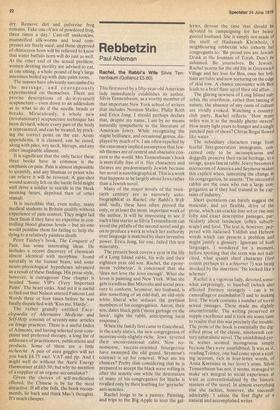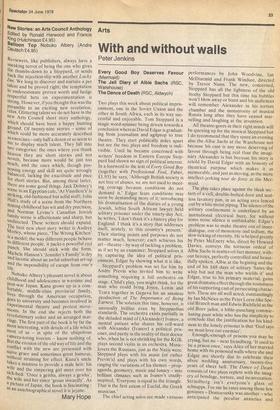Rebbetzin
Paul Ableman
Rachel, the Rabbi's Wife Silvia Tennenbaum (Gollancz £5.60)
This first novel by a fifty-year-old American lady immediately establishes its author, Silvia Tennenbaum, as a worthy member of that important New York school of writers that includes Norman Mailer, Philip Roth and Erica Jong. I should perhaps declare that, despite my name, I am by no means naturally sympathetic to the literature of American Jewry. While recognizing the staple brilliance, and occasional genius, displayed by much of it, I am often repelled by the customary implied assumption that Jewish themes are of central and obsessive concern to the world. Mrs Tennenbaum's book is mercifully free of it. Her characters and themes are predominantly Jewish because her novel is autobiographical. This is a work that happens to be largely aboutJews rather than a Jewish novel.
Many of the major novels of the twentieth century are as narrowly autobiographical as Rachel, the Rabbi's Wife and, sadly, these have often proved the only, or at least the most, important work of ' the author. It will be interesting to see if such a late starter as Silvia Tennenbaum can avoid the pitfalls of the second novel and go on to produce a work in which her authority over language is matched by sheer inventive power. Erica Jong, for one, failed this test miserably.
The present book covers a year in the life of a Long Island rabbi, his wife and their eighteen year old son. Rachel, the eponymous 'rebbetzin', is concerned that she 'does not love the Jews enough'. What she loves is painting and New York. What she gets is endless Bar Mitzvahs and social pressure to conform. Seymour, her husband, is also something of an odd-ball, an old-style white liberal who seduces the prettiest members of his congregation. Aaron, their son, dates black girls ('more garbage on the lawn', sighs the rabbi, anticipating local response).
When the family first came to Gateshead, in the early sixties, the new congregation Of nouveau-only-slightly-riche Jews revered
their unconventional rabbi. Now nononsense, success-oriented bourgeoisie
have swamped the old guard. Seymour's contract is up for renewal. What are his chances? Pretty slim considering that he is prepared to accept the black wave rolling in after the semitic one while the detestation of many of his congregation for blacks is rivalled only by their loathing for `goyische' anti-semites.
Rachel longs to be a painter. Painting, and trips to the Big Apple to tour the gal
!cries, devour the time that should be devoted to campaigning for her beleaguered husband. She is simply not made of the stuff of Hadassah Kleinholz, a neighbouring rebbetzin who exhorts her congregants to: 'Be proud you are Jewish. Drink at the fountain of Torah. Don't be ashamed. Be yourselves. Be Jewish.' Rachel yearns for the old life in Greenwich Village and her love for Ben, once her brilliant art tutor and now teetering on the edge of skid row. A chance encounter with Bee leads to a brief flare-up of their old affair.
The glaring newness of Long Island suburbia, the overthrow, rather than taming of nature, the absence of any oasis of culture are vividly evoked. Watching a country club party, Rachel reflects: 'How many miles was it to the muddy ghetto streets? How many light years to hunger and a single patched pair of shoes? Chivas Regal flowed like water.'.
The The subsidiary characters range from fearful first-generation immigrants, concerned only to be inconspicuous and doggedly preserve their racial heritage, to a savage, quasi-fascist rabbi. Jewry becomes a microcosm of America and Seymour makes this explicit when, lamenting the change in his congregation, he asserts: 'The successful rabbis are the ones who run a large congregation as if they had trained to be captains of industry.'
Short quotations can barely suggest the muscular, and yet flexible, drive of the prose, which can crackle into wit or rise into lofty and exact descriptive passages, particularly about landscape (often suburbscape) and food. The text is, however, peppered with italicised Yiddish and Hebrevv
words which can present a problem and might justify a glossary. Ignorant of both languages, I wondered for a moment, before spotting that the term was not italicised, what quaint slued character (first cousin perhaps to a schnorrer?) was being invoked by the assertion: 'He looked like a schemer'.
Rachel is a vigorous lady, devoted,somewhat surprisingly, to baseball (which also affected Portnoy strangely can it be camouflage or assimilation?) and to making love. The work contains a number of torrid sexual passages. These made me slightly uncomfortable. The writing preserved its supple excellence and it took me some time to reatize that this was precisely the trouble.
The prose of the book is essentially the dignified prose of the classic, nineteenth cen
tury naturalistic novel. The uninhibited ero tic scenes seemed incongruous simply because they were uninhibited. It was as if, reading Tolstoy, one had come upon a sizzl ing account, rich in four-letter words, of Anna Karenina in her lover's arms. Silvia Tennenbaum has not, it seems, managed to make sex integral to social experience at least as conventionalized by the historic masters of the novel. In almost everything else she tackles, however, she succeeds admirably. I salute the first flight of a natural and accomplished writer.
New Stories: an Arts Council Anthology Edited by Ronald Harwood and Francis King (Hutchinson £4.95) Balloon Top Nobuko Albery (Andre Deutsch £4.95)
Reviewers, like publishers, always have a sneaking terror of being the one who gives the thumbs-down to a Stoppard, or sends
back the rejection-slip with another Lucky Jun. We long to discover and nurture a pet
talent and be proved right; the temptation to underestimate proven worth and hedge respectful bets on experimentation is strong. However, if you thought this was the preamble to an exciting new revelation, relax. Glittering talent we do not have in the new Arts Council short story anthology, Which should have been a happy hunting ground. Of twenty-nine stories — some of Which could be more accurately described as exercises —only half a dozen or so seem to me to display much talent. They fall into two categories: the ones where you thank heaven they are short stories and not novels, because more would be just too Much, and the ones which, though possessing energy and skill are quite wrongly balanced, lacking the exactitude and pace for short stories. But, among these latter, there are some good things. Jack Debney's scene in an Egyptian cafe, 'At Vassiliou's' is striking, old-fashioned but solid stuff; John Hall's study of a scene from the Northern mining childhood has wit and dry precision,
and Norman Levine's Canadian Jewish family scene is affectionate and sharp, but
undirected. These writers should expand.
The best new short story writer is Audrey Morley, whose piece, `The Wrong Kitchen'
is a model; the way different people behave to different people, it packs a powerful end Punch. She should stick with the form. Michele Hanson's 'Jennifer's Family' is dry and laconic about an awful suburban set-up and the impossibility of escape from one's life.
Nobuko Albery's pleasant novel is about Childhood and adolescence in wartime and Post-war Japan. Kana grows up in a comfortable, middle-class provincial family, lives through the American occupation, goes to university and becomes involved in experimental theatre and protest movements. In the end she rejects both the revolutionary suitor and an arranged marriage. The first part of the book is by far the most interesting, with details of a life which most of us — in spite of the ubiquitous camera-toting tourists — know nothing of. But the erosion of the old way of life and the conflict with the new are presented with naive grace and sometimes great humour, Without straining for effect. Kana's uncle takes a mistress to provide a male heir: his Wife and the simpering girl meet over his sick-bed: 'Once a geisha, always a geisha', tbe.wife and her sister 'groan inwardly'. As a picture of Japan, the book is fascinating : as an autobiographical novel it is jejune.
Mary Hope















































 Previous page
Previous page